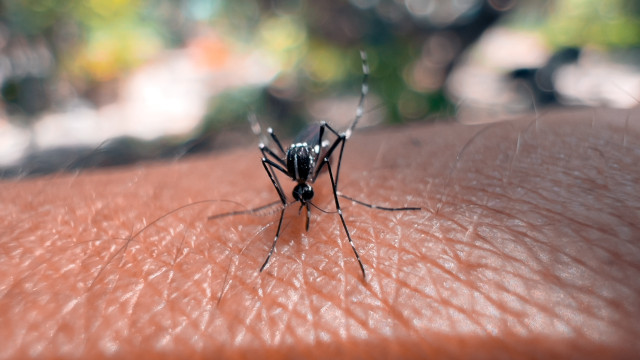






























See Also
See Again
© Shutterstock
0 / 31 Fotos
Dark chocolate - Dark chocolate helps keep your cortisol down in two main ways. Firstly, it contains antioxidants, which help protect your cells against oxidative stress.
© Shutterstock
1 / 31 Fotos
Dark chocolate - Secondly, dark chocolate also contains magnesium, a mineral that helps with sleep and in doing so reduces anxiety.
© Getty Images
2 / 31 Fotos
Dark chocolate
- It is important to be aware, however, that dark chocolate also contains caffeine, which can increase cortisol levels. It should therefore be enjoyed in moderation.
© Shutterstock
3 / 31 Fotos
Avocados
- Next up we have avocados, which are packed with healthy fats and have a reputation for being a 'super food.'
© Shutterstock
4 / 31 Fotos
Avocados
- Avocados contain magnesium, which, as previously explained, helps keep cortisol levels under control.
© Getty Images
5 / 31 Fotos
Avocados - Avocados are also high in fiber, which means they help the body in many other ways, from reducing inflammation to treating digestive disorders.
© Shutterstock
6 / 31 Fotos
Fermented foods - Most people know that fermented foods, such as yogurt and kefir, are important for maintaining a healthy gut. Fewer people know, however, that this impacts serotonin levels.
© Shutterstock
7 / 31 Fotos
Fermented foods - Around 90% of the neurotransmitter serotonin, which plays an important role in the body's stress response, is produced in the gastrointestinal (GI) tract.
© Shutterstock
8 / 31 Fotos
Fermented foods
- By eating enough fermented foods and maintaining a healthy gut, we can therefore encourage proper serotonin production.
© Shutterstock
9 / 31 Fotos
Bananas - Bananas keep cortisol levels to a minimum in two key ways. Firstly, they are high in magnesium, and therefore offer all the same benefits mentioned previously.
© Shutterstock
10 / 31 Fotos
Bananas - Secondly, bananas are high in tryptophan, an essential amino acid that is converted into serotonin in the brain.
© Shutterstock
11 / 31 Fotos
Bananas
- Fruits and vegetables have a number of health benefits in general, and those benefits include stress management.
© Getty Images
12 / 31 Fotos
Leafy greens
- Next up we have leafy greens, such as spinach and kale. These are not everyone's favorite, but they are incredibly beneficial.
© Shutterstock
13 / 31 Fotos
Leafy greens - Leafy greens are high in vitamins A, C, and E, meaning they help maintain brain health and reduce symptoms of anxiety.
© iStock
14 / 31 Fotos
Leafy greens - Spinach in particular is also high in magnesium, which helps calm the nervous system and protect the body against stress.
© iStock
15 / 31 Fotos
Green tea
- Green tea, just like dark chocolate, is high in antioxidants, which help protect your body against oxidative stress.
© Shutterstock
16 / 31 Fotos
Green tea
- It also contains the amino acid L-theanine, which has been associated with a reduction in cognitive stress, depression, and anxiety.
© Shutterstock
17 / 31 Fotos
Green tea
- However, green tea does also contain caffeine. If you plan to drink it in large amounts, it is best to opt for a decaf version.
© Shutterstock
18 / 31 Fotos
Fatty fish
- Fatty fish, such as salmon and sardines, are high in omega-3 fatty acids, which have a number of proven health benefits.
© Shutterstock
19 / 31 Fotos
Fatty fish
- Among other things, omega-3 helps reduce inflammation, supports brain health, and promotes a sense of calm.
© Shutterstock
20 / 31 Fotos
Fatty fish - In order to further support your body's stress response, try pairing the fatty fish with nuts and seeds, such as almonds or chia and flax seeds.
© Shutterstock
21 / 31 Fotos
Lean proteins
- Lean proteins, such as chicken and turkey, contain amino acids that help form the hormones and neurotransmitters involved in the body's stress response.
© Shutterstock
22 / 31 Fotos
Lean proteins
- Chicken and turkey are great sources of lean protein. If you are vegetarian, a good option is tofu and/or beans.
© Shutterstock
23 / 31 Fotos
Lean proteins
- The added benefit of chicken and turkey is that they are high in vitamin B, which also helps the body manage its levels of stress hormones.
© Shutterstock
24 / 31 Fotos
Eggs - Last but not least we have eggs, a reliable source of protein that is important to overall health.
© Shutterstock
25 / 31 Fotos
Eggs
- As well as being a great source of protein, eggs also contain essential vitamins such as B12 and B6. These help regulate stress hormones.
© Shutterstock
26 / 31 Fotos
Eggs
- Moreover, eggs also provide essential amino acids that promote the production of neurotransmitters and therefore foster an overall sense of well-being.
© Shutterstock
27 / 31 Fotos
Other tips
- Sometimes, other lifestyle changes are also needed to get those cortisol levels down. First up, it's important to get enough quality sleep.
© Shutterstock
28 / 31 Fotos
Exercise
- It is also important, unsurprisingly, that you get enough exercise in. If the body doesn't move regularly, all of its processes become more difficult.
© Shutterstock
29 / 31 Fotos
Relaxation techniques
- And, finally, some people find it helpful to practice relaxation techniques, such as deep breathing and meditation. Making the right food choices is important, but it's not always enough. Sources: (Verywell Health) (Cleveland Clinic)
© Shutterstock
30 / 31 Fotos
© Shutterstock
0 / 31 Fotos
Dark chocolate - Dark chocolate helps keep your cortisol down in two main ways. Firstly, it contains antioxidants, which help protect your cells against oxidative stress.
© Shutterstock
1 / 31 Fotos
Dark chocolate - Secondly, dark chocolate also contains magnesium, a mineral that helps with sleep and in doing so reduces anxiety.
© Getty Images
2 / 31 Fotos
Dark chocolate
- It is important to be aware, however, that dark chocolate also contains caffeine, which can increase cortisol levels. It should therefore be enjoyed in moderation.
© Shutterstock
3 / 31 Fotos
Avocados
- Next up we have avocados, which are packed with healthy fats and have a reputation for being a 'super food.'
© Shutterstock
4 / 31 Fotos
Avocados
- Avocados contain magnesium, which, as previously explained, helps keep cortisol levels under control.
© Getty Images
5 / 31 Fotos
Avocados - Avocados are also high in fiber, which means they help the body in many other ways, from reducing inflammation to treating digestive disorders.
© Shutterstock
6 / 31 Fotos
Fermented foods - Most people know that fermented foods, such as yogurt and kefir, are important for maintaining a healthy gut. Fewer people know, however, that this impacts serotonin levels.
© Shutterstock
7 / 31 Fotos
Fermented foods - Around 90% of the neurotransmitter serotonin, which plays an important role in the body's stress response, is produced in the gastrointestinal (GI) tract.
© Shutterstock
8 / 31 Fotos
Fermented foods
- By eating enough fermented foods and maintaining a healthy gut, we can therefore encourage proper serotonin production.
© Shutterstock
9 / 31 Fotos
Bananas - Bananas keep cortisol levels to a minimum in two key ways. Firstly, they are high in magnesium, and therefore offer all the same benefits mentioned previously.
© Shutterstock
10 / 31 Fotos
Bananas - Secondly, bananas are high in tryptophan, an essential amino acid that is converted into serotonin in the brain.
© Shutterstock
11 / 31 Fotos
Bananas
- Fruits and vegetables have a number of health benefits in general, and those benefits include stress management.
© Getty Images
12 / 31 Fotos
Leafy greens
- Next up we have leafy greens, such as spinach and kale. These are not everyone's favorite, but they are incredibly beneficial.
© Shutterstock
13 / 31 Fotos
Leafy greens - Leafy greens are high in vitamins A, C, and E, meaning they help maintain brain health and reduce symptoms of anxiety.
© iStock
14 / 31 Fotos
Leafy greens - Spinach in particular is also high in magnesium, which helps calm the nervous system and protect the body against stress.
© iStock
15 / 31 Fotos
Green tea
- Green tea, just like dark chocolate, is high in antioxidants, which help protect your body against oxidative stress.
© Shutterstock
16 / 31 Fotos
Green tea
- It also contains the amino acid L-theanine, which has been associated with a reduction in cognitive stress, depression, and anxiety.
© Shutterstock
17 / 31 Fotos
Green tea
- However, green tea does also contain caffeine. If you plan to drink it in large amounts, it is best to opt for a decaf version.
© Shutterstock
18 / 31 Fotos
Fatty fish
- Fatty fish, such as salmon and sardines, are high in omega-3 fatty acids, which have a number of proven health benefits.
© Shutterstock
19 / 31 Fotos
Fatty fish
- Among other things, omega-3 helps reduce inflammation, supports brain health, and promotes a sense of calm.
© Shutterstock
20 / 31 Fotos
Fatty fish - In order to further support your body's stress response, try pairing the fatty fish with nuts and seeds, such as almonds or chia and flax seeds.
© Shutterstock
21 / 31 Fotos
Lean proteins
- Lean proteins, such as chicken and turkey, contain amino acids that help form the hormones and neurotransmitters involved in the body's stress response.
© Shutterstock
22 / 31 Fotos
Lean proteins
- Chicken and turkey are great sources of lean protein. If you are vegetarian, a good option is tofu and/or beans.
© Shutterstock
23 / 31 Fotos
Lean proteins
- The added benefit of chicken and turkey is that they are high in vitamin B, which also helps the body manage its levels of stress hormones.
© Shutterstock
24 / 31 Fotos
Eggs - Last but not least we have eggs, a reliable source of protein that is important to overall health.
© Shutterstock
25 / 31 Fotos
Eggs
- As well as being a great source of protein, eggs also contain essential vitamins such as B12 and B6. These help regulate stress hormones.
© Shutterstock
26 / 31 Fotos
Eggs
- Moreover, eggs also provide essential amino acids that promote the production of neurotransmitters and therefore foster an overall sense of well-being.
© Shutterstock
27 / 31 Fotos
Other tips
- Sometimes, other lifestyle changes are also needed to get those cortisol levels down. First up, it's important to get enough quality sleep.
© Shutterstock
28 / 31 Fotos
Exercise
- It is also important, unsurprisingly, that you get enough exercise in. If the body doesn't move regularly, all of its processes become more difficult.
© Shutterstock
29 / 31 Fotos
Relaxation techniques
- And, finally, some people find it helpful to practice relaxation techniques, such as deep breathing and meditation. Making the right food choices is important, but it's not always enough. Sources: (Verywell Health) (Cleveland Clinic)
© Shutterstock
30 / 31 Fotos
Foods proven to reduce cortisol
Eating to keep your stress levels down
© Shutterstock
Cortisol is a steroid hormone that helps regulate the body's response to stress. It plays an important role in keeping us healthy and safe, but it is important not to let cortisol levels in the body get too high.
High cortisol levels can cause symptoms such as weight gain, high blood pressure, and muscle weakness in your upper arms and thighs. Thankfully, there are certain foods you can incorporate into your daily diet to help keep those cortisol levels down.
Curious? Check out this gallery to find out more.
RECOMMENDED FOR YOU




































MOST READ
- Last Hour
- Last Day
- Last Week








